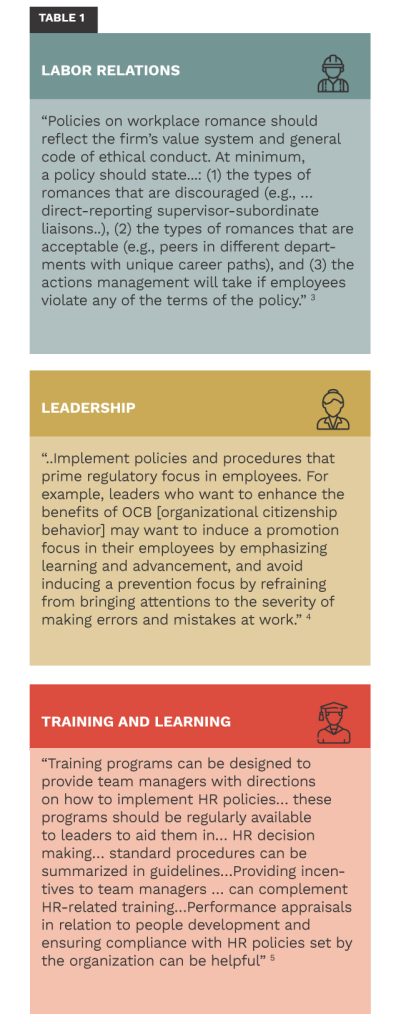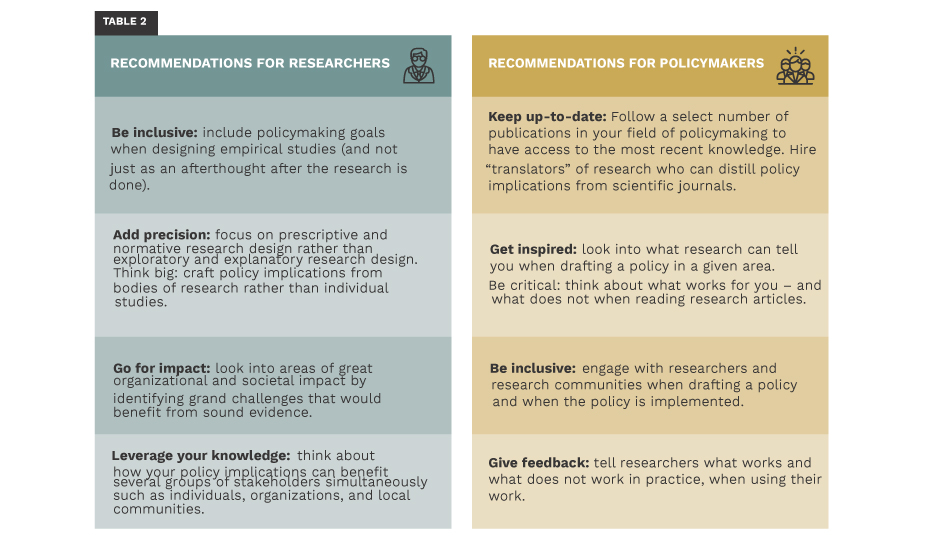By Søren H. Jensen, Sascha Kraus and Herman Aguinis
One of the key stated goals of management research is to improve policymaking. But, based on a review of 4,026 articles published over the past decade in ten leading management journals, we found that only 1.5 % included policy implications regarding organizational behavior and human resources management. Those few areas for which researchers suggested policies are labor relations, leadership, training and development, justice and fairness, and diversity and inclusion. We argue that the paucity of policy implications in management research is caused by researchers’ lack of perceived importance and value of policymaking given that they are usually not explicitly recognized and rewarded. We suggest integrating policymaking as a part of doctoral education in business and management and offer five recommendations for both policymakers and for researchers to advance the presence and use of evidence-based policymaking.
Evidence-based Policy is Crucial for Advancing Organizations and Society
Consider the following evidence. The key to creating policies that help support female tech entrepreneurs to become more successful is to identify the backgrounds, characteristics, and motivations of potential founders that are most aligned with technological success. This approach is more powerful than just offering generic help for female entrepreneurs. Also, increasing support at universities to help female entrepreneurs start a business based on their university studies is beneficial for helping women create successful tech-based businesses. These are conclusions based on recent research,1 and a clear example of how policies that are beneficial for both individuals or companies and society as a whole can benefit from good, reliable, valid and actionable knowledge.
Policies govern behavior and actions in organizations and in society at large. Building policies on what actually works (i.e., evidence-based policies) are key to putting the knowledge gained from research into practice. The recent pandemic is a clear example of this: research has been used extensively to develop the solutions we need to protect our societies.
To What Extent is Management Research Producing this Useful Knowledge?
Given the obvious importance of informing policymakers, it is not surprising that policy implications are often cited in academia as an important outcome of good research. The reality, however, is quite different. A recent study we conducted revealed that out of over 4,000 research articles from ten leading management journals published over the last decade, only 61 contained policy implications based on organizational behavior and human resources research.2 In other words, despite being labeled important by academia and obviously relevant for society, only 1.5% of the published articles offered advice on how to improve policy based on research in these two domains. This means that the regular audiences for policy implications – both inside organizations as well as on a legislative level – remain poorly informed, and good research remains underutilized at an alarming rate. Not only is it a shame that so much insight is left on the table, it is rather puzzling that such a large shortcoming has gone under the radar for so long.
Why this Absence of Policy Implications?
While it is often mentioned that policy implications are important in research, the truth is that few policymakers make use of academic research in their work. Our research hints at some of the reasons for this phenomenon. It became clear that many policy implications were either quite indirect or not very specifically stated, making them difficult for policymakers to implement. In addition, there are only few, if any, doctoral programs at universities that include formal training in policy, and often researchers lack the knowledge to articulate with sufficient clarity what policy should look like. Lack of knowledge easily leads to lack of awareness and a general reluctance to formulate policies if researchers do not know how to formulate them properly. As a result, policy implications are often left out of research publications. To illustrate how widespread this is, we found that some of the leading management journals did not publish a single article with policy implications over a period of a decade.
The reality is that policymakers not necessarily make policy decisions based on political beliefs, not on research that may run counter to or does not support their beliefs. Moreover, policies that are unpopular, even if effective, may not lead to a positive election outcome. Therefore, public policy is, at best, research-inspired. For policies directed at managers, it is inherently difficult to cover all industries because research is usually focused on one single industry. Comparing the demands of policymakers with the range of policy implications from research provides a clearer picture of the root causes of the problems.
Is There Light at the End of the Tunnel? Which Areas Carry Policy Implications?
Despite a rather bleak picture about the presence of policy implications in management research, we uncovered some interesting and quite surprising patterns. Even more encouraging, we also found several examples of policy implications that were very simple and clearly stated. These examples lead us to be optimistic about future management research and its implications for policymaking: they show that it is indeed possible to formulate well-reasoned, well-articulated, effective policy implications that are realistic. This is of interest to not only policymakers but organizational leaders more generally. Moreover, for researchers, they serve as benchmarks and good examples of how to proceed in formulating policy implications. Overall, these are clear and tangible examples of best practice.
By far, most policy implications were created in the areas of labor relations, leadership, and training and learning. These three areas are central to organizations in all industries, suggesting that there is, after all, an awareness of the importance of policy guidance in business research. This also suggests that while there is not a general awareness of the importance and usefulness of including policy implications, there are indeed researchers who are developing good and useful policy implications.
First, labor relations is a very broad field that is in flux as increasing remote work has become the new normal. It is an area that needs orientation. It is hardly surprising that this area is relatively well covered by research. Second, good leadership drives societies, inspires and motivates people, and is a central element of management research. It attracts a lot of attention because it is easy to see effective leadership – or lack thereof – in organizations. Third, in today’s job market, where lifelong learning is increasingly in demand by companies and individuals, training and learning are becoming more important. Organizations are striving to improve by providing training to their employees. A lot of attention is being paid to this area, which is also reflected in the literature.
To illustrate what a good research-based policy implication looks like, Table 1 includes one from each of the three areas.

All three examples clearly demonstrate how research findings can be transformed into actionable policy implications and serve as inspiration for future policy implications. Looking more closely at the qualities of the three policy implications, we find that the resource requirements for their implementation in practice are low to medium and are related to updating processes and programs. All three policies are directly implementable. In terms of relevance, all three are relevant to all types of organizations – public and private. The policy’s impact on leadership and training and development is also directly relevant to the organization’s managers or human resources department.
In our study, we classified policy implications into three distinct, sequential categories: Awareness, Learning, and Action. Comparing the three categories of policy implications, we found that policy implications for both leadership and education and training cover all three categories, while the implications for labor relations cover both awareness and action. In short, all three policy implications are applicable across industries and sectors, are relatively inexpensive, can be implemented quickly, and have significant impact on practice. Yet they are unicorns in management research and, to our knowledge, have not yet been tested in practice.
Disappointingly, our study uncovered that several topic areas did not contain a single policy implication despite their obvious importance to today’s organizations: creativity, international human resources management, negotiation, and stress and well-being. It is particularly troubling that areas such as stress and well-being, which have become even more important as a result of COVID-19, did not include a single policy implication to offer over a ten-year period.
The Path Forward
Clearly, not all management and business research must have policy implications. Some research is conceptual, some is basic research, and neither lends itself to policy implications. In addition, some empirical research may not produce results robust enough to warrant specific policy implications. However, it is equally clear that we can do much better than the meager 1.5% of articles that contain actionable policy implications. We owe it to society and the organizations we study to help them use the knowledge we create through our empirical research.
We suggest that researchers become more aware of the importance of drawing sound policy conclusions when results warrant them. We recommend that doctoral programs in business and management offer courses on policy. This would provide prospective researchers with a good foundation for understanding the nature and elements of policy formulation based on their research when it is relevant. Table 2 summarizes our recommendations for researchers and policy makers.

In closing, most academics wish to have broad impact with their research. However, most also lack sufficient training on how to create research-based policies and universities usually do not have incentive systems in place to encourage researchers to focus on policymaking. In addition, policymakers rightfully find most research lacking implications for policy—as demonstrated by our own study. What is needed is collaboration and co-creation so that researchers and policymakers can produce and implement evidence-based policies that will benefit themselves as well as society.6
About the Authors
 Søren H. Jensen is Associate Professor at Copenhagen Business School, Denmark. He received a Ph.D. in Strategy and Management, also from Copenhagen Business School and has served on the Board of Governors of the Academy of Management. He conducts research in strategy and management.
Søren H. Jensen is Associate Professor at Copenhagen Business School, Denmark. He received a Ph.D. in Strategy and Management, also from Copenhagen Business School and has served on the Board of Governors of the Academy of Management. He conducts research in strategy and management.
[email protected]
 Sascha Kraus is Professor of Management at the Free University of Bozen-Bolzano, Italy, and Distinguished Visiting Professor at the University of Johannesburg, South Africa. The leading German financial magazine “Wirtschaftswoche” ranked Professor Kraus no. 2 of all German-speaking Business & Management professors in the category “Current Research Performance” in 2020.
Sascha Kraus is Professor of Management at the Free University of Bozen-Bolzano, Italy, and Distinguished Visiting Professor at the University of Johannesburg, South Africa. The leading German financial magazine “Wirtschaftswoche” ranked Professor Kraus no. 2 of all German-speaking Business & Management professors in the category “Current Research Performance” in 2020.
[email protected]
 Herman Aguinis is the Avram Tucker Distinguished Scholar at The George Washington University School of Business. He has published eleven books including Performance Management for Dummies. His research, teaching, and consulting focus on the intersection of data and behavioral science. Since 2018, he has been ranked among the world’s 100 most impactful researchers in economics and business by the Web of Science Highly Cited Researchers Reports. [email protected]
Herman Aguinis is the Avram Tucker Distinguished Scholar at The George Washington University School of Business. He has published eleven books including Performance Management for Dummies. His research, teaching, and consulting focus on the intersection of data and behavioral science. Since 2018, he has been ranked among the world’s 100 most impactful researchers in economics and business by the Web of Science Highly Cited Researchers Reports. [email protected]
References
- Woolley, J. L. (2019). Gender, education, and occupation: How founder experiences influence firm outcomes. Academy of Management Discoveries, 5, 266–290.
- Aguinis, H., Jensen, S. H., & Kraus, S. (2022). Policy implications of organizational behavior and human resource management research. Academy of Management Perspectives, 36, 857-878.
- Mainiero, L. A., & Jones, K. J. (2013). Sexual harassment versus workplace romance: Social media spillover and textual harassment in the workplace. Academy of Management Perspectives, 27, 187-203.
- Koopman, J., Lanaj, K., & Scott, B. A. (2016). Integrating the bright and dark sides of OCB: A daily investigation of the benefits and costs of helping others. Academy of Management Journal, 59, 414-435.
- Pak, J., & Kim, S. (2018). Team manager’s implementation, high performance work systems intensity, and performance: a multilevel investigation. Journal of Management, 44, 2690-2715.
- Aguinis, H., Audretsch, D. B., Flammer, C., Meyer, K., Peng, M. W., & Teece, D. J. (2022). Bringing the manager back into management scholarship. Journal of Management, 48, 1849-1857.



























![“Does Everyone Hear Me OK?”: How to Lead Virtual Teams Effectively iStock-1438575049 (1) [Converted]](https://www.europeanbusinessreview.com/wp-content/uploads/2024/11/iStock-1438575049-1-Converted-100x70.jpg)





